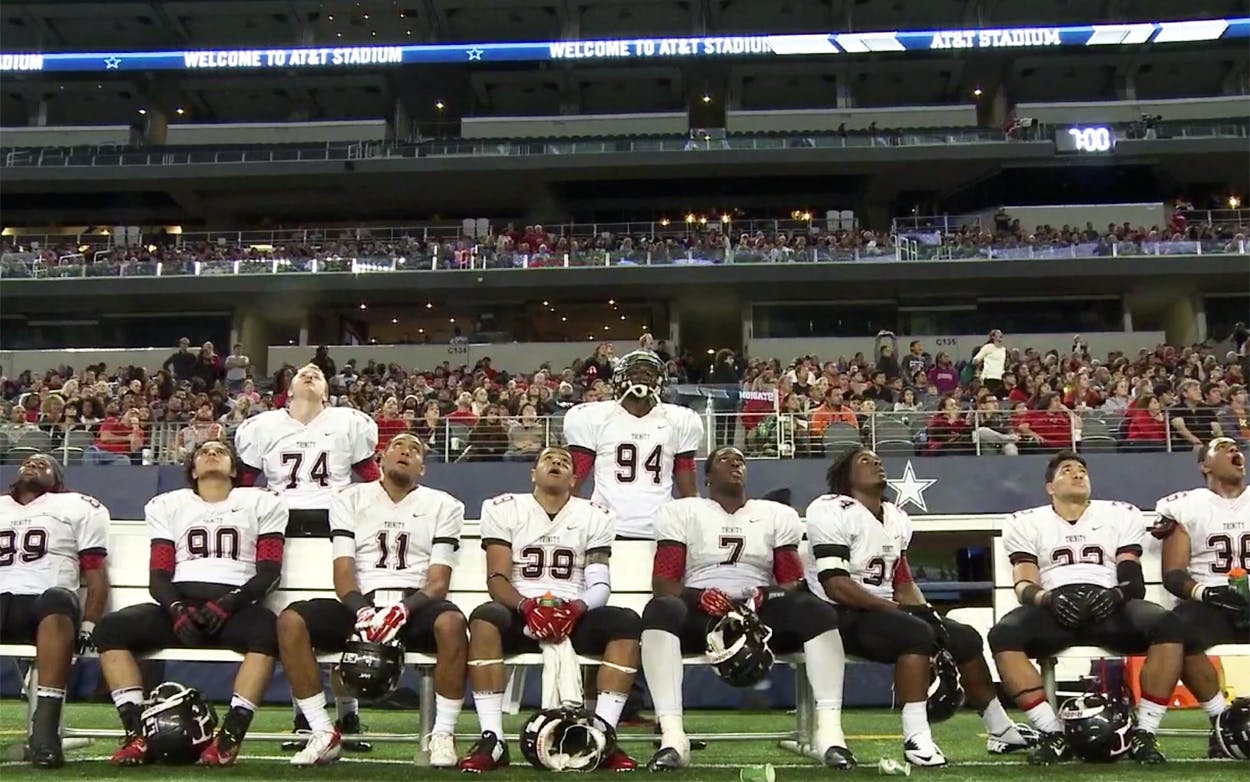Euless is home to one of the largest Tongan communities in the U.S., which initially formed as immigrants came to the Texas city for its proximity to Dallas-Fort Worth International Airport and its jobs. Over the past few decades, Tongans have brought their own Polynesian traditions to local life in Euless, including on the field, as players have transformed Trinity High into a football powerhouse. In From Tonga, Huay-Bing Law, then a student in the Department of Radio-Television-Film at the Moody College of Communication at UT Austin, explores how the immigrants have revitalized the local high school football team.
Texas Monthly: How did you find out about the Tongan football players in Euless?
Huay-Bing Law: I was in a documentary class with Paul Stekler, and I started searching for a documentary topic. I had always wanted to do a sports doc—I’m a big fan of ESPN’s “30 for 30” series—so I started digging though old sports articles in Texas. I came across one piece on the Tongans in Euless, and I had never heard of it, but I wanted to see them in person. I emailed the head coach asking to meet with him, and he forwarded it to the defensive coach at the time, Moses Vakalahi. He’s a Tongan and a former player there. He became the point person connecting me with players and with families—every Tongan person in Euless knows each other.
TM: From Tonga focuses on the story of one player, Patrick Vahe. Why did you decide to follow one character?
HL: At first, I’d go up every Friday night to see the high school games and shoot footage, but I didn’t have direction on how to tell the story. In my documentary class, Stekler said to tell larger stories through character, so I was searching for who stuck out to me and helped me tell what the story was. Patrick was the star of the team—he was the one who would take his helmet off when saying the war chant before each game. I couldn’t help but gravitate toward that. And then the more time I spent with him and his family, the more I recognized it as the perfect vehicle to tell the story of the community.
TM: What was Patrick’s family like?
HL: They were incredibly welcoming. I first met them over Thanksgiving weekend, and they invited me over for Thanksgiving dinner. It was nothing but open arms.
TM: Are you still in touch with Patrick?
HL: I filmed From Tonga during his last year in high school. After, he played for four years for the Longhorns—he was the first Tongan to play football at UT Austin. He’s a senior now, and has had a very successful college career at UT. We still text every now and then.
TM: How much time did you spent with Patrick and the team over the course of the documentary?
HL: I would drive from Austin to Dallas every weekend for two to three months. I followed the trajectory of their season up until they were eliminated in the playoffs in December.
TM: What was it like to follow these high school kids for a season and spend so much time filming them?
HL: They seemed to be pretty natural in front of the camera. With the coach vouching for me, I think that allowed them to open up a bit. As I kept going to the school and the campus and the games, they started to warm up. By the tenth or so visit, it was like I wasn’t even there. I was able to get a lot of moments I couldn’t if I had only gone one or two times: locker room moments, trying to fit into a jersey, moments between family members, doing their postgame ritual. I became invisible after a while.
TM: What was most surprising to you about the Tongan players and the community?
HL: I was surprised how incredibly sensitive all these 300-pound football players were. One day, one of them had a ukulele, and I asked them, do you have any songs you can play? They started to play this beautiful Tongan song, right in the middle of the courtyard at school. It was beautiful to see this side of football players.
TM: There’s no narrative of xenophobia in From Tonga. Did you expect to see any resistance to the Tongan traditions—like having the whole football team perform a Tongan chant before each football game—from other Euless residents?
HL: I had considered that angle, of an element of racism or being an outsider in the community, and I was keeping an eye open for that. From what I learned from talking to people, there was a lot of acceptance and assimilation through football. There weren’t as many barriers as I would have thought, coming in. The whole Tongan community there was so open and warm, and it’s completely ingrained in the school now—in my interview with the head coach, he was wearing a t-shirt saying, “I love you family” in Tongan. Through football, this immigrant population was able to find their own place in Texas.
This interview has been edited for clarity and length.
- More About:
- Film & TV
- Filmmaker
- Documentary






